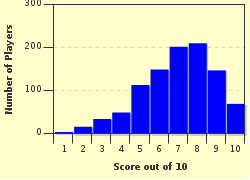Quiz Answer Key and Fun Facts
1. Intuition is defined as "knowing without the use of rational thought". Sometimes you just know not to go down a certain street or answer the door, but you cannot explain why. What is NOT characteristic of intuition?
2. Ancient philosophers like Plato believed in the existence of intuition as a viable source of knowledge. In fact, intuition was classified as the highest-order of knowledge. Where did Plato believe intuitive understanding originated from?
3. In the modern-day, intuition has been largely ignored as a subject of scientific study. Why?
4. Intuition helps us make decisions based on a 'gut feeling'. For example, pretend that you are playing in a quiz competition. You are asked the question: "Which river is the longer - the Mississippi or the Chu?" Clueless, you blurt out "The Mississippi!" Bravo! You have won! In these types of cases, what is intuition normally based on?
5. People who have successfully avoided catastrophic situations, like inexplicably taking the day off in New York City on September 11, 2001 , have reported that certain physical symptoms preceded their intuitive decision. These physical symptoms included: hair standing up on the nape of one's neck; muscle tension; unusual heartbeat; headaches; bodily shaking; increased breathing; and, stomachaches. What is generally true about physical intuition?
6. Sometimes you meet a person who just gives you a bad feeling for no reason at all. Intuitively, you do not trust or like this person. The feeling is instant and complete. What type of intuitive sign are you experiencing?
7. Women experience greater intuitive responses than men do.
8. Purposeful intuition is the utilization of one's "inner vision" when trying to understand a situation or make a selection. This type of mental process allows a person to do all of the following EXCEPT:
9. Metacognition can briefly be described as "thinking about thinking". Proponents of intuition-based decision-making lament the fact that there are no techniques for improving one's intuitive capabilities.
10. People who regularly follow their intuition, rather than relying on critical analysis, tend to be more optimistic and self- secure. What other benefit do they generally reap? (Stop. Take a deep breath. Don't think too hard about the question; just try following your intuition!)
Source: Author
Pagiedamon
This quiz was reviewed by FunTrivia editor
Bruyere before going online.
Any errors found in FunTrivia content are routinely corrected through our feedback system.


